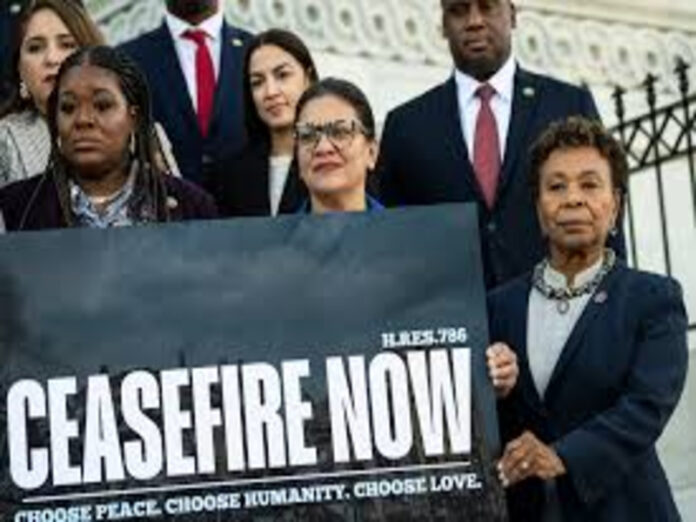The War In Gaza Has Ended, But America’s Loudest Anti-Israel Voices Have Nothing To Say Now That Hamas’s Lies Have Been Exposed
Tuesday, October 14, 2025, 9:45 A.M. ET. 5 Minute Read, Opinion, By Jennifer Hodges: Englebrook Independent News,
WASHINGTON, DC.- The war in Gaza is, for now, over. A ceasefire has brought an official, if fragile, pause in the violence. The rockets and airstrikes have mostly quieted, the headlines have shifted elsewhere, and the cameras are gone. But the question that now must be asked is: what about the voices that roared during the war? Where are they now?
For two years, a chorus of Members of Congress and activist circles positioned themselves loudly as defenders of Palestinians. They demanded a ceasefire, accused Israel repeatedly of war crimes and “genocide,” and led or joined protests on campuses from Harvard to Columbia that frequently crossed into antisemitic rhetoric or tactics. Then, when the guns fell silent (for now), they went silent too.
That silence demands scrutiny.
From Loud Demands To Muted Murmurs;
Look back over 2023 through 2025: the names U.S. Lawmakers such as the likes of Rashida Tlaib, Ilhan Omar, Alexandria Ocasio-Cortez, and former U.S. House Rep. Cori Bush, and Jamaal Bowman dominated headlines as the most vocal critics of Israel’s military response to Hamas. They introduced ceasefire resolutions, accused Israel of ethnic cleansing, and repeatedly called for cutting U.S. aid to the Jewish state.
Yet when the ceasefire was brokered and it appeared that the hostages were going to be released, a moment that should demand moral clarity, those exact figures largely disappeared from the discussion. As The Washington Examiner recently noted, “Democrats who condemned Israel’s Gaza war are silent after ceasefire.” Some, like Ayanna Pressley, posted a short acknowledgment. But high-profile voices such as Tlaib, Omar, and AOC offered no reflections, no congratulations, and no recognition of what happens next.
That gulf between fervent protest and postwar silence raises a few uncomfortable conclusions. Perhaps their advocacy was never truly about the well-being of Gazans, but rather about political posture.
Perhaps they feared backlash if they acknowledged Hamas’s role in Gaza’s devastation. Or possibly, they simply lack a constructive vision for what peace actually requires.
Whatever the reason, the silence suggests something transactional, allegiance to a cause only when it serves a narrative, not a consistent commitment to humanity.
Campus Protests: Liberation Rhetoric And Jewish Fear;
The war’s echo was felt far from the Middle East, across America’s elite universities. What began as pro-Palestinian demonstrations often mutated into something darker.
At Columbia University, Jewish students reported being confronted by masked protestors demanding, “Are you a Zionist?” and others heard chants of “Zionists don’t deserve to live.” In some instances, according to eyewitness reports, protesters shouted “Kill all the Jews.” Similar scenes unfolded at Harvard, Stanford, and major state campuses, where encampments, lockdowns, and disciplinary actions followed days of unrest.
Surveys by Jewish organizations painted a grim picture: nearly one-third of Jewish college students say faculty members have promoted antisemitic ideas, and 43 percent admit they avoid expressing their views about Israel due to fear. Those figures come from recent studies by the American Jewish Committee and the World Jewish Congress.
The result is an academic environment poisoned by intimidation. These campus protests did not elevate Palestinian dignity; they inflamed antisemitism and replaced moral clarity with mob pressure.
Did They Support Hamas More Than Gaza?
If public protest and congressional outrage are meant to defend the innocent, they should begin with truth. But too many of the war’s most outspoken critics could not bring themselves to condemn Hamas, the very group that triggered the war and used civilians as shields.
To support Palestinians morally means confronting the whole truth: that Hamas embedded rocket sites in hospitals, schools, and apartment towers; that Hamas diverted humanitarian aid; that Hamas fired from civilian areas to invite retaliation for propaganda purposes. Yet for much of the progressive activist bloc, those facts were inconvenient and ignored.
By framing Hamas as “resistance” rather than terrorism, they betrayed the very civilians they claimed to champion. Their silence about Hamas’s barbarity, while denouncing Israel’s right to defend itself, signaled that their outrage was never balanced.
And so now, as the smoke clears, one must ask: did they truly stand for Gaza’s people, or for Hamas’s narrative?
The Reckoning After The Fire;
Now that the ceasefire has taken hold and hostages are home, the world faces the hard work of rebuilding Gaza and reimagining security for both peoples. The voices that demanded “Ceasefire now!” must answer a new question: What now?
Will they push for Palestinian reform and accountability?
Will they help rebuild civil institutions and reject Hamas’s return to power?
Will they speak against antisemitism on campuses that became breeding grounds for hate under their watch?
If they genuinely cared about Palestinians, they would not retreat into silence. They will lead, not as agitators, but as bridge-builders. They will speak honestly about Hamas’s crimes, Israel’s challenges, and the necessity of a future built on coexistence, not slogans.
Because after two years of blood, fear, and fury, moral credibility can no longer be measured by who shouts the loudest, only by who tells the truth when it’s hardest to speak.
Editor’s Note:
This Op-Ed reflects the author’s analysis and opinions on post-war political and social reactions following the 2023-2025 Israel-Hamas conflict. It draws upon verifiable reporting from sources including The Washington Examiner, Politico, the American Jewish Committee, and World Jewish Congress reports documenting antisemitism on U.S. campuses. All claims regarding events, statements, or surveys are based on published records as of October 14, 2025.




